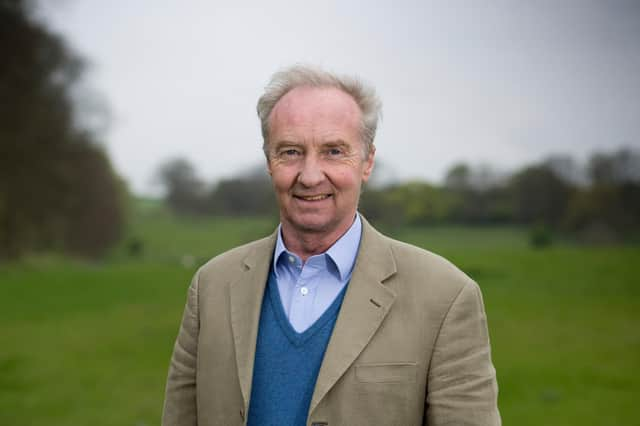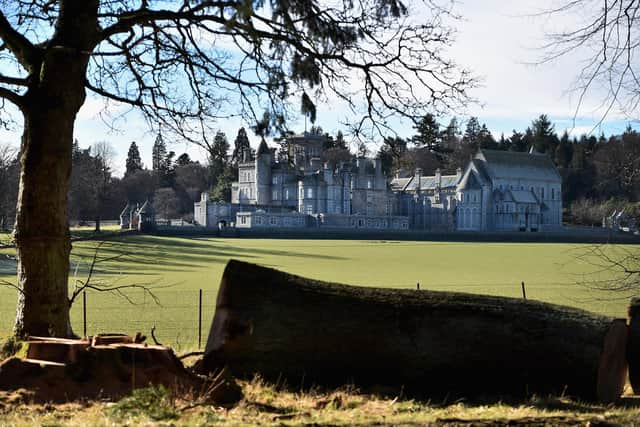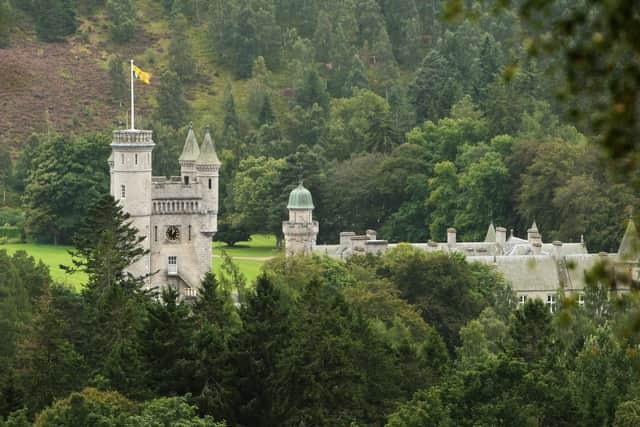Leading aristocratic families paid £14m in EU subsidies since referendum


The latest story in The Scotsman’s series on the biggest beneficiaries of the Common Agricultural Policy (CAP) scheme can reveal that the Duke of Buccleuch and his family firms accounted for more than a third of those subsidies.
Scotland’s representative body for community landowners said the system of public payments allowed monopoly private landowners to “extract natural capital's economic value” from rural communities.
Advertisement
Hide AdAdvertisement
Hide AdBut Scottish Land & Estates, which represents estate owners and land managers, said the recipients were “significant rural businesses” which employed many people, and stressed that much CAP funding was reinvested in local communities.


It comes after The Scotsman revealed how MPs, MSPs, councillors, and peers have received nearly £6m through the initiative since the EU referendum, with wealthy foreign landowners also receiving several million pounds via holdings ultimately owned in tax havens.
An analysis of records maintained by the UK Department for Environment, Food, and Rural Affairs (DEFRA) show that Richard Scott, the Duke of Buccleuch, and three of his family firms recouped £4,965,329 in CAP payments between 2016 and 2019.
The 66-year-old, one of Scotland’s largest private landowners, is worth £230m, according to the latest Sunday Times Rich List. The latest accounts for Buccleuch Estates show the business made £51.3m profit after tax in the year to 31 October 2019, compared with £12.4m in the preceding year.
The majority of the subsidies, some £3m, was paid to Buccleuch Estates Limited, which owns almost 217,000 acres of rural land across the UK. A further £1.7m went to Bowhill Farming Limited, which oversees a 8,800 acre expanse of land in the Scottish Borders between the Yarrow and Ettrick valleys, used to grow spring barley, oats, and kale.


Companies House records list MDS Estates Limited as having significant control over both firms. MDS, a holding company, counts the duke and several members of his family among its directors. Its most recent annual accounts show a profit of £45.3m. Other payments were made to the duke and an entity called Buccleuch Woodlands Limited.
Adrian Dolby, head of agriculture at Buccleuch, said the company was a “diverse rural business” employing around 450 people, with a “significant in-hand farm business” across the south of Scotland.
He explained: “While our farming and forestry operations are conducted at a significant scale, we are no different to any rural business which is eligible for CAP support. Any funding we receive is reinvested in our business operations and helps sustain employment, both directly and in the communities where we are located.”
Advertisement
Hide AdAdvertisement
Hide AdMr Dolby added funding helped the firm pursue various environmental and research initiatives, such as a farming network using advanced technology to aid productivity, as well as conservation work including peatland restoration, carbon sequestration, and biodiversity.
Elsewhere, Moray Estate Developments, which is controlled by a holding company in which John Douglas Stuart, Earl of Moray, is the sole shareholder, received £2,790,449 during the same period.
The Stuart family, descended from King James V of Scotland, have multiple business interests spanning golf, business parks, and the new community of Tornagrain. It also oversees more than 11,500 acres of farmland and 10,000 acres of commercial forestry throughout the country.
Andrew Howard, managing director of Moray Estates, said it had been an “active farming business” for several generations, and that like any other farming enterprise, it uses CAP funding to support farming work, as well as diversification and environmental management.
He said that the farming and estate business does not pay dividends to the Moray family, and “recycles all profits into investment in the business” which focuses on community benefits. He added: “Our farms support not only our own staff but many other partners, contractors, suppliers and others in our local communities.”
The Rosebery estate partnership in South Queensferry received £2,337,733. It oversees four estates stretching from the Firth of Forth to the uplands of the Pentland Hills, and includes the grand Gothic revival mansion, Dalmeny House, home to Neil Primrose, the Earl of Rosebery, a grandson of Archibald Primrose, the 19th century British prime minister.
The imposing property has been closed to visitors during the coronavirus pandemic, but in recent months, it has been used as the shooting location for a new Netflix romantic comedy film. Rosebery did not respond to an enquiry from The Scotsman.
Dunecht Home Farms, a family partnership based on the 53,000 acre Dunecht Estates spanning Aberdeenshire and Kincardineshire, recouped £1,809,971 in subsidies.
Advertisement
Hide AdAdvertisement
Hide AdThe estates are owned by Charles Pearson, 64, the younger son of the late Third Viscount Cowdray, and trusts for his two children. They are home to farms, a forestry business, grouse moors, and letted properties, as well mineral quarries and concrete plants.
Stuart Young, chief executive of Dunecht Estates, said: “Dunecht Home Farms is a farming enterprise with substantial arable and livestock operations. The enterprise accesses available support and grant schemes like any other farmer and trades with many small, medium and larger scale businesses delivering a wide range of economic activity, including local employment, across north east Scotland.
“In recent times this has included projects involving environmental works on internationally protected sites, tree planting and enhancing public access.”
The Luss Estates company, which has extensive landholdings throughout the Loch Lomond area, as well as business interests in farming, hospitality, forestry, and renewable energy, received £1,280,955.
According to Companies House filings, both Sir Malcolm Colquhoun, the clan chief and prominent aristocrat, and Stephen Arthur, a taxation specialist with expertise in UK taxation and offshore trusts, are listed as having significant control over the firm.
Simon Miller, the chief executive officer of Luss Estates, said: “We make absolutely no apology for operating within the standard system of government subsidies that exists for all farming enterprises, big and small, across the country, or for seeking to maximise employment and financial opportunities for the local community. Without subsidies, loss making hill farms such as ours and the crucial stewardship of the land that they provide simply would not exist.”
Mr Miller said that the estate’s investment in hill farming - which includes over 3,500 sheep and 130 breeding cattle - and other environmentally beneficial projects “far exceeds” the amount it had received in subsidies, and pointed out it undertakes significant landscape scale environmental work on behalf of the Scottish Government.
He added the seven-figure subsidy payments reflected the “size and scale” of the company, which employs more than 100 people, and said the funds were received by the firm, not the Colquhoun family personally.
Advertisement
Hide AdAdvertisement
Hide AdFurther south, the home of Francis Egerton, the Duke of Sutherland, was paid £926,036 via the CAP scheme.
The company, Mertoun Estate Farms Limited, is owned by the duke and his family, and the 80-year-old lives at Mertoun House, an A-listed 18th century country house near St Boswells in the Scottish Borders. Its most recent accounts do not include profit or loss details, but register assets worth £3.7m and state that the business employs 16 people. Mertoun Estate Farms did not respond to an enquiry from The Scotsman.
Meanwhile, the DEFRA databases reveal extensive payments linked to members of the Royal family.
Balmoral Estate, owned and funded by the Queen personally, rather than as sovereign, received £137,081.
A spokeswoman for Balmoral said: “Like many farms across the UK, Balmoral’s farming operation receives an annual subsidy to support the management of the farm, which is home to native Highland cattle.
“In 2018, the estate received an additional grant to implement a long-term forest management plan to protect and conserve the Ballochbuie - an area of ancient Caledonian Pine forest.”
Further south, Home Farm, based on the Dumfries House estate and overseen by Prince Charles’s charitable foundation, was paid £447,130 in subsidies.
Despite that, the last three annual accounts for the venture, filed with Companies House, show it ran up cumulative losses of £324,482. The supermarket giant, Morrisons, was originally part of the farm initiative, but pulled out five years ago.
Advertisement
Hide AdAdvertisement
Hide AdA spokesman for the Prince’s Foundation said: "Home Farm was established to support rare breed animals and to promote organic farming.
“We have boosted the numbers of more than a dozen rare breeds and attained organic certification while also providing employment and support for businesses within East Ayrshire and further afield."
Commenting on the subsidies detailed by The Scotsman, Dr Calum MacLeod, policy director of Community Land Scotland, said: "It's crucial to have accountability and transparency regarding large-scale and concentrated private landownership in Scotland.
“We need to end the scope for extracting natural capital's economic value from our rural communities through public payments to monopoly private landowners without significant concomitant local community investment by such landowners to protect the public interest."
Sarah Jane Laing, chief executive officer of Scottish Land & Estates, said: “Estates are significant rural businesses employing many people directly and indirectly in communities. Estate businesses that are actively involved in farming or forestry are eligible for support through the CAP and other schemes in the same way as other rural businesses.
“CAP payments are made to estates for exactly the same reasons they are made to other farmers – to ensure high production standards , to create and sustain jobs and rural economic activity as well as delivering environmental benefits.”
She added: “Applicants have to adhere to strict compliance measures and are subject to inspections. Research shows that much of CAP funding is reinvested locally through wages, services and capital investment using local businesses. All CAP payments are a matter of public record.”
A message from the editor:Thank you for reading this article. We're more reliant on your support than ever as the shift in consumer habits brought about by coronavirus impacts our advertisers. If you haven't already, please consider supporting our trusted, fact-checked journalism by taking out a digital subscription.
Comments
Want to join the conversation? Please or to comment on this article.
